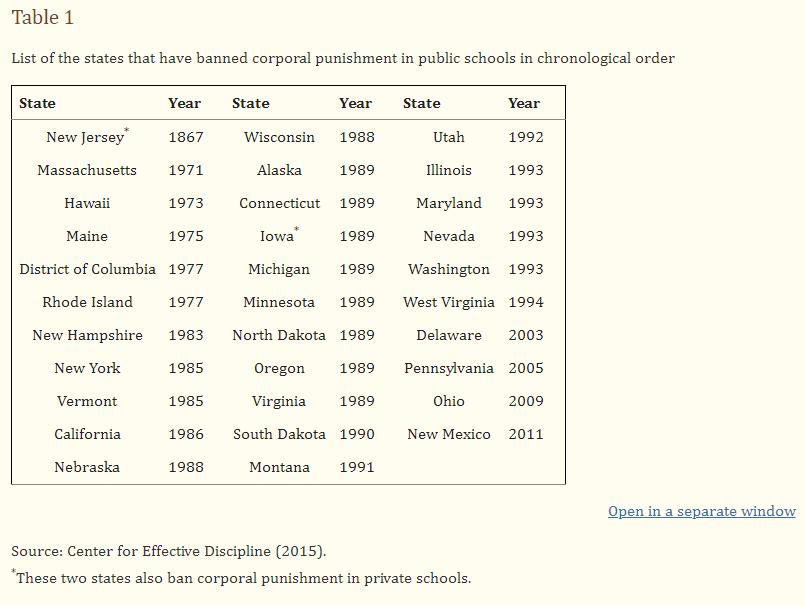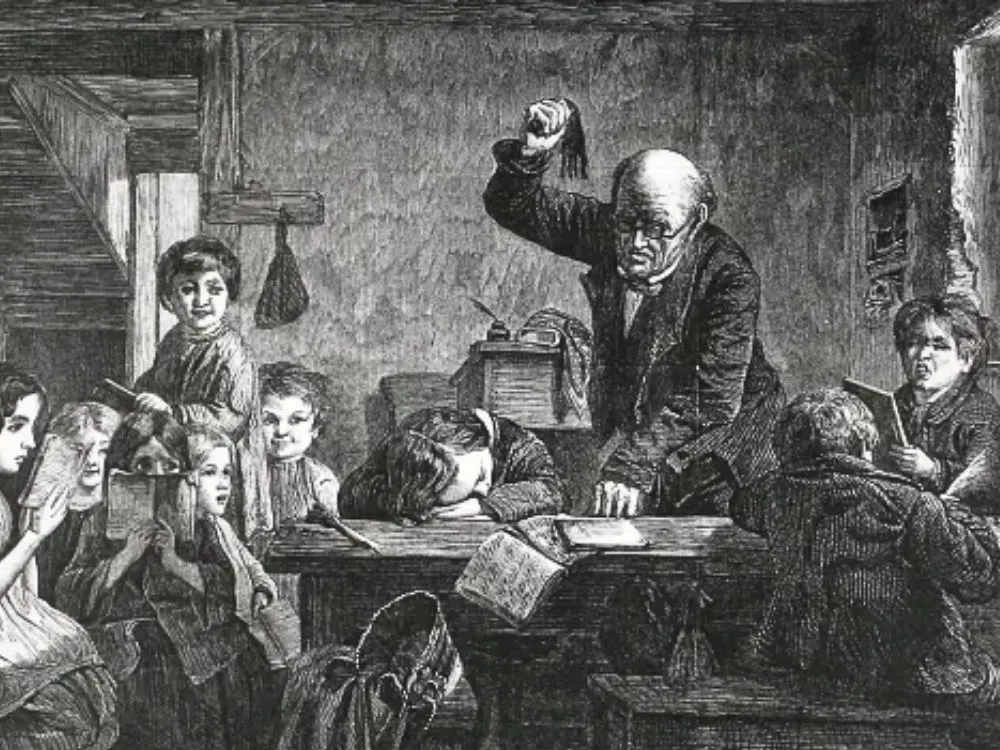Currently, there are 19 states in America where corporal punishment in school is legal. In some districts, the school must have the parents’ permission, while others do not. In 1977, the U.S. Supreme Court ruled in its Ingraham v. Wright decision that corporal punishment in schools is constitutional, leaving states to decide whether to allow it.
The ages of the students can be anywhere from preschool to 12th grade. The states that currently allow it are Alabama, Arkansas, Arizona, Colorado, Florida, Georgia, Idaho, Indiana, Kansas, Kentucky, Louisiana, Missouri, Mississippi, North Carolina, Oklahoma, South Carolina, Tennessee, Texas, and Wyoming. It is also legal in private schools in all states except New Jersey, Iowa, New York and Maryland.
What is Corporal Punishment Exactly?
Corporal punishment is defined as “the use of physical force with the intention of causing a child to experience pain so as to correct their misbehavior,” and over 160,000 children in these states are subject to corporal punishment in schools each year. The kind of physical force used varies by state.
Still, it is generally like the one offered in the Texas Education Code, which specifies permissible corporal punishment as “The deliberate infliction of physical pain by hitting, paddling, spanking, slapping, or any other physical force used as a means of discipline.” While some states object to the use of a paddle, it is still allowed in 15 of the 19 states.

Disproportionate Usage
There are many issues with corporal punishment in schools. It is disproportionately used on boys, children with disabilities, and students of color. Children with physical, mental, or emotional disabilities are given special protections and services in U.S. public schools. Surprisingly, they are not given protection from corporal punishment in the states that allow it. “In many states, they are actually at greater risk for receiving corporal punishment than their non-disabled peers.”
According to a report written by Human Rights Watch and the American Civil Liberties Union, the United States Department of Education’s Civil Rights Data Collection shows that students with disabilities are subjected to corporal punishment at disproportionately high rates for their share of the population. “Children with disabilities are 50 percent more likely to experience school corporal punishment in more than 30 percent” of the school districts where it is legal. However, in other school districts, “children with disability status are five times more likely to be subject to corporal punishment than peers without disabilities.”
In Oklahoma, it is still legal to use corporal punishment against a special needs child. The disabilities listed include autism, deafness, orthopedic impairment, and speech or language impairment. So last year, a bill was proposed to make it illegal to use corporal punishment against students who are classified as Special Education.

Oklahoma Bill Would Make It Illegal To Be Used on Special Ed. Students
House Bill 1028 was introduced by Republican State Representative John Talley and Republican Senator Dave Rader last year. However, it failed to pass after some Republicans voted against it. The Bill returned this past April and and was passed by the Senate with 31 votes to 11, meaning it will return to the House for consideration. The bill prohibits “hitting, slapping, paddling, or any other means of inflicting physical pain on students with disabilities such as “autism, deafness, orthopedic impairment, and speech or language impairment.”

The Bill Actually Caused Debate and Originally Failed
There was much debate on this bill by senators. “Republican Senator Shane Jett called the bill ‘communist ideology,’ but Senator Mary Boren, a Democrat, said she ‘never understood why a parent would need the school to spank their child.’” Boren added, “In my Christian parenting classes, the relationship was an integral part in the use of corporal punishment to have a tender, loving relationship if corporal punishment was ever going to be effective. If you don’t have that relationship and that tenderness and ‘this hurts me more than it hurts you’ kind-of attitude, all you’re doing is giving swats, and they’re moving on with their day.”
Republican Senator Paul Rosino said his grandchild is autistic, and hitting him doesn’t help discipline him. He added, “Taking children, especially children with disabilities, and using corporal punishment as a way to keep them in line is an awful way to discipline them. I heard something about… ‘this is a motivational tool.’ It’s not a tool. It’s hitting.”
State representative John Talley was asked why he introduced the bill and he said, “I’m passionate about kids. My whole life I’ve worked with kids. But my wife retired as a special ed teacher, district administrator, and principal of an alternative school. So she’s seen a lot of students be misused, mistreated through her work with special needs students. I just think a special needs student does not need to deal with that pain because they would be wondering, why is this happening to me?”

